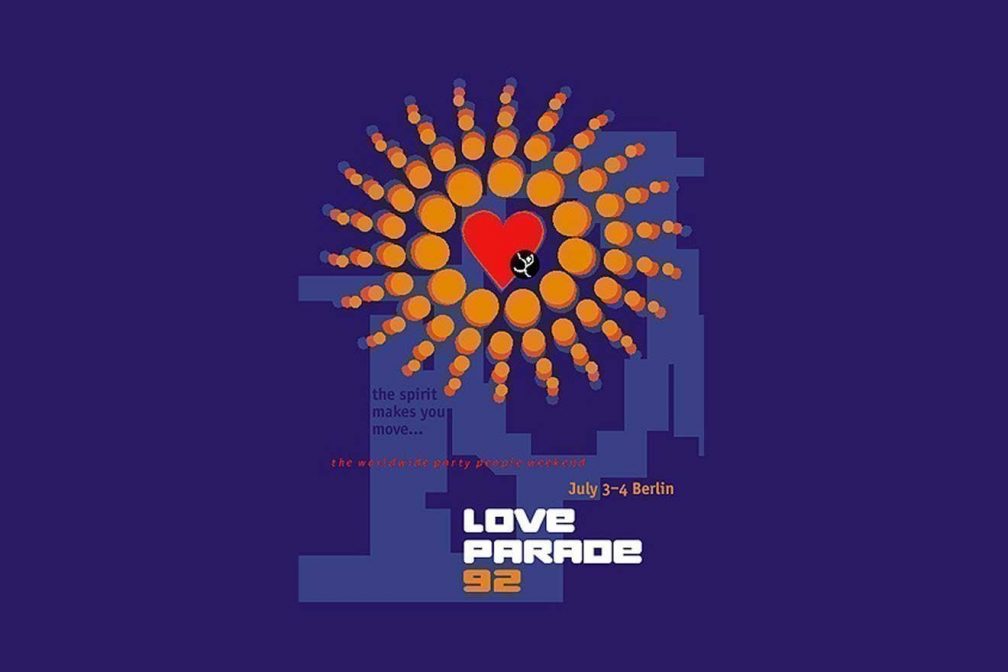 Features
Features
Love Parade '92: The sound of the family
Matthew Collin recalls the Berlin Love Parade of 1992 and reveals how it was inspired by the UK’s Summer of Love
The stormtroopers of peace: a vision of early Berlin techno distilled to its essence… The next year, Tanith went even further, arriving at the Love Parade with a decommissioned Soviet tank that he had somehow obtained. There is an iconic photograph of him from that time: standing high and mighty on top of the Russian behemoth, swathed in camouflage and raising aloft a voodoo skull as if invoking the spirits to put his mutant crew under the spell of his music.
"For a lot of people, drugs work!" the voice from our sound system repeated, over and over again. The freaks were already out, cutting loose outside the department stores and the supermarkets. Buffed muscle boys, stripped to the waist to show off their gym-toned chests, pranced and twirled behind us while a long-hair in a fractal shirt vogued like a hippie fairy… one man skipped along in a chemical warfare suit and gas mask, while another lay prone in the very middle of the road, naked apart from his underwear, staring intently at the cosmos inside his head…
There was no shortage of utopian rhetoric swirling in the ether at that time – considering the amount of MDMA that was percolating through most people's nervous systems, it's hardly surprising. Further out than most however was the perennial idealist who invented the Love Parade in 1989, just a few months before the Berlin Wall came down: Matthias Roeingh, better known as Dr Motte, a Berlin-born DJ who played in a punk band in the early 80s and then went on to run some of the city's first acid house clubs.
Acid house, for Motte, was an escape hatch from the walled city of the 80s into realms of consciousness where, with the right chemical assistance, dreamers could slip the bonds of reality and float freely. "It was like discovering a new territory," he explained later. "There was a wall in Berlin and then suddenly there is a door in that wall, and you can look behind… it was incredible. It opened up our minds and we discovered ourselves."
Motte's own inspiration came from a trip to Britain during 1988's acid house 'Summer of Love'. "Friends of mine told me about underground parties they went to in London, Manchester and Sheffield, where police came and stopped the parties and took the soundsystem but people were still dancing outside in the streets with ghettoblasters, having a street party," he told me, his eyes glittering with nostalgic fervour. "Ah, street party! It was immediately in my mind, how can we do that here? A spontaneous street party – how?"
Late one night in 1989, Motte came up with the most monumental prank of his life, one which would help to define the decade that would follow and even help to transform the image of the entire city, although he could hardly have known this at the time. Motte decided to hold a demonstration for happiness and unity in t he heart of his still-divided metropolis, a protest against nothing but rather for all that he believed was right and good: a ravers' promenade, bringing his people out of the subterranean darkness and into the light – a Love Parade…
At the very beginning, he chose 'Friede, Freude, Eierkuchen' as the event's slogan, an ironically humorous German expression that means'Peace, Joy and Pancakes'. Motte claimed this meant that the event was a protest for peace and global understanding through music and equitable food distribution, and he applied for the event to be registered as a political demonstration, which meant he wouldn't have to pay for policing or the post-party clean-up. The authorities took him seriously and he got the permit, but some of Motte's allies at the time believed it was just a cheeky scam to get permission to hold a rave right in the heart of the city. "It was a trick, and I liked the idea because it was a typical Berlin anarchistic thing," said DJ Westbam.


